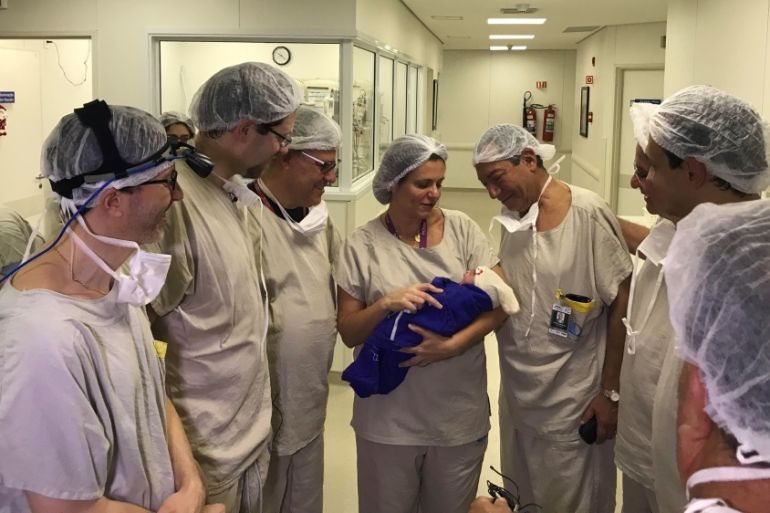‘Medical milestone’ as first baby born from womb of dead donor
Breakthrough procedure could help thousands of women unable to have children due to uterine problems, researchers say.

A woman in Brazil who received a womb transplanted from a dead donor has given birth to a healthy baby girl in the first successful case of its kind, doctors reported.
The breakthrough operation, carried out in September 2016, shows that such transplants are feasible and could help thousands of women unable to have children due to uterine problems, according to a study published on Wednesday in The Lancet medical journal.
Keep reading
list of 4 itemsWoman, seeking loan, wheels corpse into Brazilian bank
UK set to ban tobacco sales for a ‘smoke-free’ generation. Will it work?
Poland lawmakers take steps towards liberalising abortion laws
The case involved connecting veins from the donor uterus with the then-32-year-old’s recipient’s veins, as well as linking arteries, ligaments and vaginal canals.
It comes after 10 previously known cases of uterus transplants from deceased donors – in the United States, the Czech Republic and Turkey – failed to produce a live birth.
The baby girl born in the Brazilian case was delivered via caesarean section at 35 weeks and three days, and weighed 2,550 grams, the case study said.
Dani Ejzenberg, a doctor at Brazil’s Sao Paulo University hospital who led the research, said the transplant shows the technique is feasible and could offer women with uterine infertility access to a larger pool of potential donors.
The current norm for receiving a womb transplant is that the organ would come from a live family member willing to donate it.
“The numbers of people willing and committed to donate organs upon their own deaths are far larger than those of live donors, offering a much wider potential donor population,” Ejzenberg said in a statement about the results, describing the procedure as a “medical milestone”.
He added, however, that the outcomes and effects of womb donations from live and deceased donors have yet to be compared, and said the technique could still be refined and optimised.
‘Extremely exciting’
The first baby born after a live donor womb transplant was in Sweden in 2013. Scientists have so far reported a total of 39 procedures of this kind, resulting in 11 live births.
Experts estimate that infertility affects around 10 to 15 percent of couples of reproductive age worldwide. Of this group, some two in 1,000 women have uterine problems.
Before uterus transplants became possible, the only options to have a child were adoption or surrogacy.
In the Brazilian case, the recipient had been born without a uterus due to a condition called Mayer-Rokitansky-Küster-Hauser syndrome. The donor was 45 and died of a stroke.
Five months after the transplant, Ejzenberg’s team wrote, the uterus showed no signs of rejection, ultrasound scans were normal, and the recipient had regular menstruation. The woman’s previously fertilised and frozen eggs were implanted after seven months, and 10 days later she was confirmed pregnant.
At seven months and 20 days – when the case study report was submitted to The Lancet – the baby girl was continuing to breastfeed and weighed 7.2kg.
“We must congratulate the authors,” commented Srdjan Saso, an honorary clinical lecturer in obstetrics and gynaecology at Imperial College London, describing the findings as “extremely exciting”.
Richard Kennedy, president of the International Federation of Fertility Societies, also welcomed the announcement but sounded a note of caution.
“Uterine transplant is a novel technique and should be regarded as experimental,” he said.